Nature crisis: One in six species at risk of extinction in Great Britain
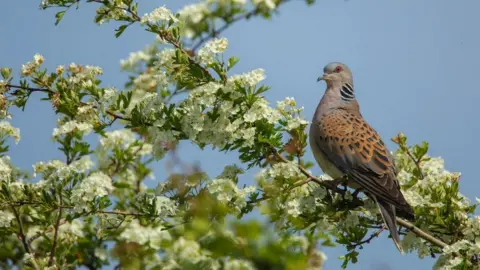 Ben Andrew/RSPB
Ben Andrew/RSPBNumbers of the UK's most precious animals and plants are still falling, as a countrywide nature-loss crisis continues.
Loss of nature is outpacing investment and effort to tackle it, conservation organisations say.
Their State of Nature report found 16% of 10,000 mammals, plants, insects, birds and amphibians assessed were threatened.
They include UK wildlife icons such as the turtle dove and hazel dormouse.
The government has said it is committed to "increasing the amount of habitat for nature to thrive".
But conservation organisations say more investment and a shift to much more wildlife-friendly farming and fishing are urgently needed.
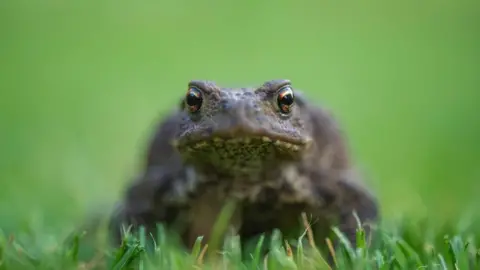 Ben Andrew/RSPB
Ben Andrew/RSPBThe 203-page document was produced by more than 60 organisations, including wildlife conservation groups, government agencies and academics.
Its analysis of decades of research paints a grim picture - natural spaces and the wildlife that depends on them are in decline.
Nida al-Fulaij, from the People's Trust for Endangered Species, told BBC News: "The main takeaways from this report are alarming."
And she explained how thousands of studies used in the report examined the abundance or distribution of UK wildlife.
'Bleak outlook'
"Where we can, we count species year after year," Ms Fulaij said.
"Another way to measure how a plant or animal is faring is to repeatedly examine a site and ask, 'Is the species here or not?'"
Plants and animals monitored since the 1970s have declined in abundance by an average 19%.
And this trend suggests a bleak outlook for much of the country's native wildlife, conservation scientists say.
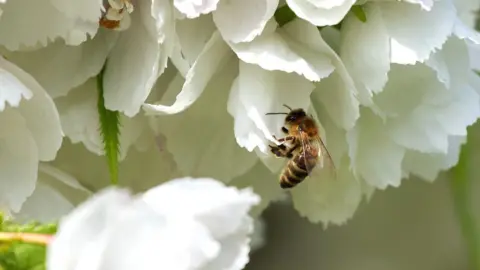 Victoria Gill
Victoria GillThis should make everyone "sit up and listen", Royal Society for the Protection of Birds (RSPB) chief executive Beccy Speight said.
Restoring nature would also help to tackle the climate crisis.
"We need to move far faster as a society towards nature-friendly land and sea use," Ms Speight said.
"Otherwise, the UK's nature and wider environment will continue to decline and degrade, with huge implications for our own way of life."
Responding to these calls for action, the government said it was investing in its "30-by-30" pledge, to protect 30% of land for nature by 2030.
"At the start of this year, I published our comprehensive Environmental Improvement Plan," Environment Secretary Therese Coffey said, "setting out how we will create and restore at least 500,000 hectares [2,000 sq miles] of new wildlife habitats."
The government also highlighted investments including:
- a £25m Species Survival Fund
- £750m for woodland and peatland restoration
But RSPB conservation-science head Prof Richard Gregory told BBC News: "We'd need more to achieve the goal of 30 by 30.
"The task ahead of us to recover nature in the UK is large and complex - we are really talking of billions of pounds and not millions to change systems and tackle the drives of decline.
"That investment would return a huge amount for society in time and save huge future costs if we allow the environment to continue to decline and degrade."
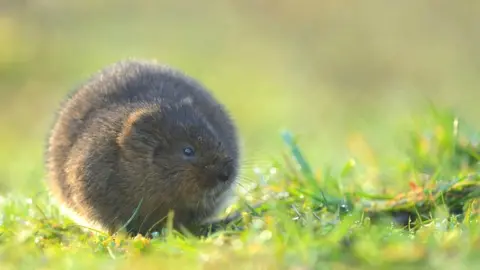 Ben Andrew/RSPB
Ben Andrew/RSPBSince 1970, the report says, of the 2,890 species in Britain's "priority group":
- 58% fell in number
- 19% increased
Also:
- Almost 1,500 UK native species of plants and animals are now threatened with extinction
- Most of the important habitats for UK nature - including woodland, wetlands and wildflower meadows - are in poor condition
- Only about 11% of UK land is within protected areas - and not all are well managed for nature and wildlife
- None of the seafloor around the UK is in "good condition", because of damage from fishing gear
In the North Pennines, Nic and Paul Renison have transformed the way they farm, to create more space for nature, dividing their 400 acres (160 hectares) into small pastures and moving their cows into a new field each day.
"The idea is that it's like the buffalo on the plains - they move every day, then the pasture gets 60 days to recover," Nic said.
With the help of the Woodland Trust, they have also planted wildlife-friendly hedgerows to create wildlife "corridors" throughout their farm.
"The more you do, the more nature you attract - it gets addictive," Paul said.
All five of the UK's resident owl species can now be found on the Renisons' farm and 50 different bird species are breeding there, a recent survey revealed.
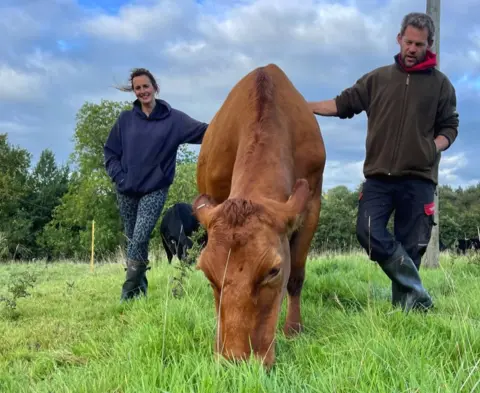
In England, an estimated 70% of land is farmed.
And studies suggest nature-friendly farming can boost production.
In one large-scale study in central England, turning over land from crops to wildlife habitat increased yields, probably by boosting the abundance of insects that pollinate those crops.
But the Nature Friendly Farming Network said more investment would be needed "to support all farmers in restoring nature and acting on climate change".
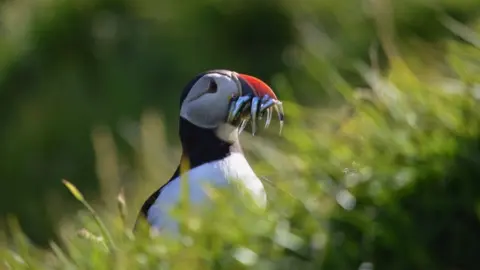 Chantal Macleod-Nolan/RSPB
Chantal Macleod-Nolan/RSPBBut the report also found "targeted conservation", concerted efforts to restore habitats and protect species, had worked well:
- The number of species in a marine protected area (MPA) in Lyme Bay, Devon, had significantly increased since trawling was banned, in 2008
- 600 sq km (150,000 acres) of the Cairngorms, in the Highlands, had been restored for woodland-dependent wildlife
- The RSPB's Hope Farm, in Cambridgeshire, had provided a research and demonstration site, showing how crop yields could been increased along with bird numbers
Report author and University of Sussex environmental-biology professor Fiona Matthews said: "We need a lot more investment [in nature].
"There is a belief in government that things can just magically happen for free."
But while she acknowledged the great work from thousands of volunteers, funded work was needed too.
"I often see a press release for £1m for this or that - but it is a drop in the ocean for what is actually required to tackle this issue," Prof Matthews said.
